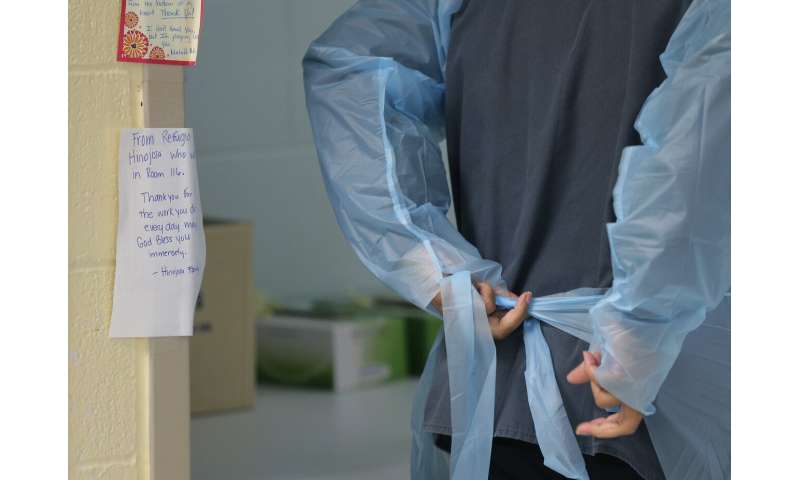

As the coronavirus pandemic surges across the nation and infections and hospitalizations rise, medical administrators are scrambling to find enough nursing help—especially in rural areas and at small hospitals.
Nurses are being trained to provide care in fields where they have limited experience. Hospitals are scaling back services to ensure enough staff to handle critically ill patients. And health systems are turning to short-term travel nurses to help fill the gaps.
Adding to the strain, experienced nurses are “burned out with this whole (pandemic)” and some are quitting, said Kevin Fitzpatrick, an emergency room nurse at Hurley Medical Center in Flint, Michigan, where several left just in the past month to work in hospice or home care or at outpatient clinics.
“And replacing them is not easy,” Fitzpatrick said.
As a result, he said, the ER is operating at about five nurses short of its optimal level at any given time, and each one typically cares for four patients as COVID-19 hospitalizations surge anew. Hospital officials did not respond to requests for comment.
But the departures are not surprising, according to experts, considering not only the mental toll but the fact that many nurses trained in acute care are over 50 and at increased risk of complications if they contract COVID-19, while younger nurses often have children or other family to worry about.

“Who can actually work and who feels safe working are limited by family obligations to protect their own health,” said Karen Donelan, professor of U.S. health policy at Brandeis University’s Heller School for Social Policy and Management. “All of those things have been factors.”
Donelan said there is little data so far on how the pandemic, which has killed more than 231,000 people in the country, is affecting nursing overall. But some hospitals had a shortage even before the virus took hold, despite a national rise in the number of nurses over the past decade.
With total confirmed coronavirus cases surpassing 9 million in the U.S. and new daily infections rising in 47 states, the need is only increasing.
Wausau, Wisconsin-based Aspirus Health Care is offering $15,000 signing bonuses for nurses with at least a year of experience and hiring contract nurses through private staffing companies to handle a surge in hospitalizations that prompted the system to almost quadruple the number of beds dedicated to COVID-19 patients.

Aspirus, which operates five hospitals in Wisconsin and four in small communities in Michigan’s Upper Peninsula, also is moving nurses around between departments and facilities as hot spots emerge, said Ruth Risley-Gray, senior vice president and chief nursing officer at Aspirus.
Outside help still is needed, in part because some nurses have gotten sick from or were exposed to the cornavirus during the current wave, which “came with a vengeance” starting in August, Risley-Gray said. At one point in mid-October, 215 staffers were in isolation after showing symptoms or being exposed to someone who tested positive, and some are just starting to return to work.
Aspirus recently was able to hire 18 nurses from outside agencies, and may need more if the surge continues.
Because the pandemic is surging just about everywhere in the country, hospitals nationwide are competing for the same pool of nurses, offering pay ranging from $1,500 a week to more than $5,000, said April Hansen, executive vice president at San Diego-based Aya Healthcare, which recruits and deploys travel nurses.

She said demand for their services has more than doubled since early in the pandemic when the greatest need was in hot spots like New York and New Jersey and then moved to southern states. In recent weeks the virus has been spiking across the country, with the new hot spots in places like the rural upper Midwest and southern-border communities such as El Paso, Texas.
Now placing nurses where they’re needed is “like a giant game of whack-a-mole,” said Hansen, whose company has about 20,000 openings for contract nurses.
In North Dakota, where infection rates are exploding, hospitals may cut back on elective surgeries and seek government aid to hire more nurses if things get worse, North Dakota Hospital Association president Tim Blasl said.
In Texas, Gov. Greg Abbott recently announced he was sending 75 nurses and respiratory therapists to El Paso to help handle the city’s surge. Wisconsin Gov. Tony Evers, meanwhile, issued emergency orders making it easier for nurses from elsewhere to practice in his state and for retired nurses to come back.

“This has been a challenge, and we’ve been pleading with the community members to protect themselves and others,” by wearing masks and social distancing, said Aspirus’ Risley-Gray, who said the positivity rate among community members tested by Aspirus rose from under 10% in September to 24% last week.
To combat the emotional toll and fatigue that comes with caring for COVID-19 patients, including just donning and removing protective equipment all day, Aspirus has been giving nurses microbreaks and quiet places to get away and collect themselves when they feel overwhelmed.
Travel nurses say the need at small hospitals tends to be greater than at larger facilities.
Robert Gardner, who’s currently assigned to a hospital in a small town about 20 miles west of Atlanta, said he did search and rescue in the Coast Guard during Hurricane Katrina and the pandemic is “a lot worse.”


He worked at a large New Jersey hospital when that state was swamped by the virus in the spring, and now worries that flu season could bring further chaos to hospitals. But he’s determined to stick it out, no matter what.
Source: Read Full Article